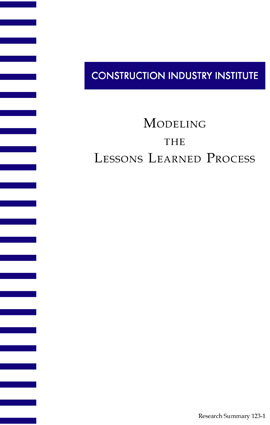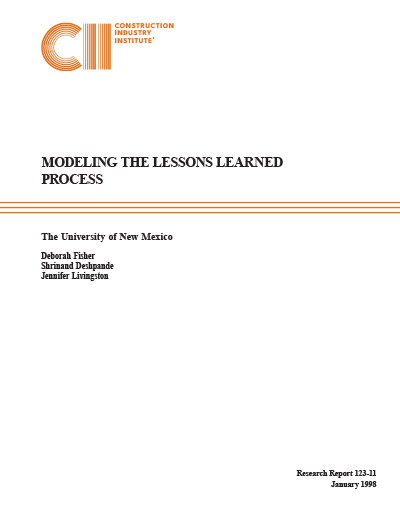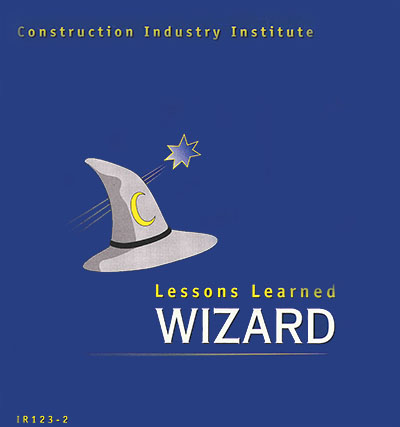
Modeling the Lessons Learned Process
Learning is a natural, and an inevitable, part of the human experience. Lessons are learned daily through personal experiences, and collectively these lessons build an individual’s knowledge base. Organizational learning, however, is more complex. In the business environment it becomes important for individuals to be able to share their experiences with others effectively, and to develop work processes that capture these experiences for the benefit of future endeavors.
CII Research Team 123, Modeling Lessons Learned, was chartered to develop a comprehensive lessons learned process for managing organizational learning. The term “lessons learned” is defined as “knowledge gained from experience, successful or otherwise, for the purpose of improving future performance.” The research team hypothesized that lessons learned represent knowledge, and that knowledge is an asset to an organization and has value.
The research has confirmed that there is indeed value in managing organizational knowledge using a Lessons Learned Process (LLP), but that significant cultural, work process, and technology issues must be addressed to be successful.
“What’s the Payback?”
Implementation of an LLP requires an up-front allocation of scarce resources. Research Team 123, however, has confirmed that implementing an LLP can result in a substantial return on investment. By leveraging knowledge, employees can be trained more quickly, provide better support, and avoid costly errors. Over the past decade, CII has identified best practices such as constructability, partnering, schedule compression, and team building, all of which add value and reduce a project’s total installed cost. The LLP will help to maximize the benefits of these best practices by providing a structured approach to “learning from experience.” Implementation of an LLP is a key component in achieving continuous improvement, and can have a significant impact on achieving overall project success.
Work Culture – The Vital Ingredient
Implementing a successful LLP is not simply a matter of “installing” a new work process. An organization’s work culture is a vitally important factor in achieving success. This report identifies the attributes of successful organizations, describes the suggested LLP work process, and lists the keys steps for successful implementation. The LLP work process description is further enhanced by the new LLP Wizard software application, which is also described.
Moving Toward a “Learning Organization”
The successful implementation of an LLP requires a commitment from all levels of the organization. When properly implemented and maintained, however, an LLP can allow an organization to achieve superior performance through higher productivity, shorter cycle times, enhanced quality, and improved safety. The LLP can become a building block in an organization’s quest to become a “Learning Organization.” It seems clear that in today’s Information Age, it is knowledge that will provide the competitive advantage, and that the successful companies will be those that can effectively manage the knowledge process.
Culture plays a significant role in the success of a LLP. A learning organizational culture is a culture that strives to create an environment conducive to learning. A learning organization is one that continually challenges the assumptions used in making important decisions. Organizational learning is a process of detecting and correcting errors. Every individual of the organization is responsible for developing a culture suitable for an LLP. It was found that if the culture originates from top management, it is more effective. Here are the typical steps that can be followed to develop a learning organizational culture. (RS123-1, p. 1)
- Assess the present culture
- Eliminate barriers
- Set goals
- Get departmental buy-in
- Designate a champion
- Empower workers
- Allocate resources
The coordination of the LLP is important to the success of the LLP. As stated in Key Finding #1, designating a champion is important to create the proper culture to foster the LLP. The LLP will have increased success if the champion comes from upper management. The coordination is a continuous and on-going process and typically includes the following. (RS123-1, p. 14)
- Providing organizational feedback on new input to the knowledge base and on any updates/modifications in the existing knowledge base
- Soliciting nominations for recognition and/or reward
- Benchmarking process effectiveness and goals
- Identifying qualified facilitators
- Developing LLP training curriculum
- Soliciting organizational expertise to develop all decision making criteria
- Developing communication vehicles such as newsletters, bulletin boards, etc.
- Assessing the LLP
- Developing position descriptions for LLP personnel (individuals and teams)
- Preparing a schedule which identifies the need for on-going contribution



